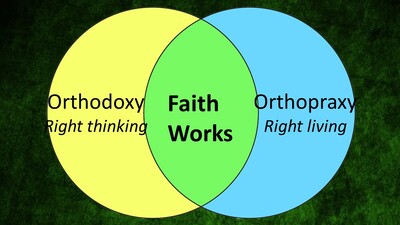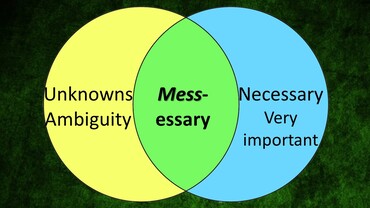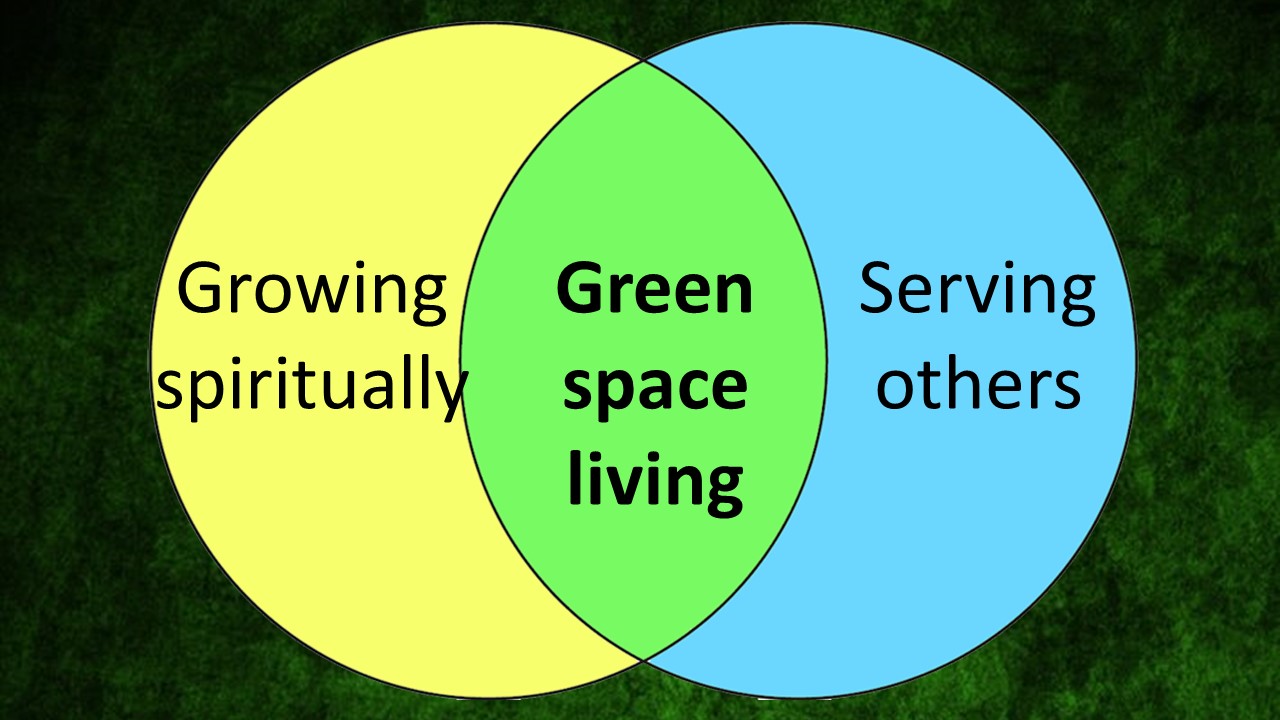Christians Should Gather, Scatter and Smell Like BBQ Wing Sauce
Luke 5:27-32
This morning we’re in our third week learning about Sacred Overlaps. Author J.R. Briggs shows us a way to move beyond our current, painful divisiveness. The norm for some time now has been to pick a side, to be pressured into saying you are either for or against something or someone. That simplistic choice strips away the opportunity to honestly examine the complexity of an issue.
Briggs uses Venn diagrams to illustrate a third way of thinking and being; rather than continuing to use an either/or paradigm, he proposes that the overlap is a better place. It’s where we can both agree on some things. It puts us on common ground, and even though there will still be tension, conversations are possible. Best of all, it’s a place of great potential where God often works in human hearts.
As we started on this series, we saw how as Christians we are resident aliens - there’s a sacred overlap. Then we considered what makes a Christian compelling. We don’t think normal or weird works, but being peculiar, or distinctive, can peek people interest in us. Then we thought about the church. Yellow (in church, growing) and blue (outreach, in the world) are both faithful, but it’s the green space that is fruitful; it’s where many people not yet on an expedition with Jesus can start to discover and desire a relationship with God.
Briggs uses Venn diagrams to illustrate a third way of thinking and being; rather than continuing to use an either/or paradigm, he proposes that the overlap is a better place. It’s where we can both agree on some things. It puts us on common ground, and even though there will still be tension, conversations are possible. Best of all, it’s a place of great potential where God often works in human hearts.
As we started on this series, we saw how as Christians we are resident aliens - there’s a sacred overlap. Then we considered what makes a Christian compelling. We don’t think normal or weird works, but being peculiar, or distinctive, can peek people interest in us. Then we thought about the church. Yellow (in church, growing) and blue (outreach, in the world) are both faithful, but it’s the green space that is fruitful; it’s where many people not yet on an expedition with Jesus can start to discover and desire a relationship with God.

Here’s one of today’s new images. The circle on the left represents the importance of Christians having right belief/thinking, or orthodoxy. The circle on the right represents right living, or orthopraxy. Both are needed; as it says in James 1:22, “Don’t merely listen to God’s word…do what it says.”
If we don’t live every day in alignment with what we say we believe, we’ll rightfully be called hypocrites. On the other hand, if someone goes around acting godly, but they’re teaching false things about God and Christianity, that endangers our reputation.
C.S. Lewis used an everyday household item, a pair of scissors, to illustrate how right belief and right actions should work together. Is one blade or two needed to cut a piece of paper? Or are they each needed for the best possible outcome? The author suggests this overlapped word: ortho-pradoxic. Right practice/belief. That’s a lofty word play some might like, but here’s a much simpler expression I heard many years ago and it packs the truth into two words: Faith Works. Our inner belief in God must be translated into action.
If we don’t live every day in alignment with what we say we believe, we’ll rightfully be called hypocrites. On the other hand, if someone goes around acting godly, but they’re teaching false things about God and Christianity, that endangers our reputation.
C.S. Lewis used an everyday household item, a pair of scissors, to illustrate how right belief and right actions should work together. Is one blade or two needed to cut a piece of paper? Or are they each needed for the best possible outcome? The author suggests this overlapped word: ortho-pradoxic. Right practice/belief. That’s a lofty word play some might like, but here’s a much simpler expression I heard many years ago and it packs the truth into two words: Faith Works. Our inner belief in God must be translated into action.
We need this generation of Christians to be all about Faith Works. Let me explain why both scissor blades are needed: if we ever hope to have green space, where seeds planted in moist soil mature and can be harvested, we need a full measure of faith and works.
See if you would agree with me on this. Churches are where disciples gather; they love and worship God with sincere hearts. Their beliefs are true and pleasing to God. But if they aren’t willing or interested in leaving the building to love, serve, and talk about their faith outside their doors, their faith has no works.
Here’s an equally important warning for the church. We can have numerous outreach ministries - our annual reports and statistics can be impressive. People may be well fed and clothed throughout the year. But what if nothing is given out, except what is put in bags? As people trudge home from our church, do they have any more hope, peace, or joy? We need good works infused with contagious love and faith. Relying on works alone denies people what they need most in life, a relationship with Jesus.
This week I encourage you to put in a prominent place these two words: Faith Works. Put it on your fridge: Faith Works. Put in on your desk or computer at work: Faith Works. Or set it on a side table where you can see it from your favorite chair: Faith Works.
A great example of faith integrated with work comes from Benedictine monks. They, and other monastic groups, remind us that “none of us can be holy in the abstract.” For them each day is a rhythm of prayer that honors God, followed by work that impacts their community. We, on the other hand, have a different life rhythm. Sundays are typically our sacred time; we may be at church an hour and a half or so, which is 1.3% of the hours we’re awake each week. That leaves close to 98% of our time for work and being holy, not in an abstract way, but in practical ways.
Now it’s time for some life application lessons. If you’re interested in green space living, the potential of sacred overlaps, and faith works experiences, two things are important. In order to move from theory to real life, from the sanctuary to the street, every Christian must first know our “why”. Why should we speak about our faith with others? Churches are on every corner, Bibles are easy to come by, and today’s technology offers massive amounts of information day and night.
Our “why” should be simple: Jesus said to his disciples, before He returned to His Father in heaven, “I’m leaving, but I send you, my followers, out to share the Good News about me with all the world.”
When you and I know “why” God matters in our life, “why” we rejoice that Jesus is our Savior, “why” reading the Bible and praying is life-changing – that makes us valuable witnesses; it’s our personal stories that help people find answers to their own WHY questions.
See if you would agree with me on this. Churches are where disciples gather; they love and worship God with sincere hearts. Their beliefs are true and pleasing to God. But if they aren’t willing or interested in leaving the building to love, serve, and talk about their faith outside their doors, their faith has no works.
Here’s an equally important warning for the church. We can have numerous outreach ministries - our annual reports and statistics can be impressive. People may be well fed and clothed throughout the year. But what if nothing is given out, except what is put in bags? As people trudge home from our church, do they have any more hope, peace, or joy? We need good works infused with contagious love and faith. Relying on works alone denies people what they need most in life, a relationship with Jesus.
This week I encourage you to put in a prominent place these two words: Faith Works. Put it on your fridge: Faith Works. Put in on your desk or computer at work: Faith Works. Or set it on a side table where you can see it from your favorite chair: Faith Works.
A great example of faith integrated with work comes from Benedictine monks. They, and other monastic groups, remind us that “none of us can be holy in the abstract.” For them each day is a rhythm of prayer that honors God, followed by work that impacts their community. We, on the other hand, have a different life rhythm. Sundays are typically our sacred time; we may be at church an hour and a half or so, which is 1.3% of the hours we’re awake each week. That leaves close to 98% of our time for work and being holy, not in an abstract way, but in practical ways.
Now it’s time for some life application lessons. If you’re interested in green space living, the potential of sacred overlaps, and faith works experiences, two things are important. In order to move from theory to real life, from the sanctuary to the street, every Christian must first know our “why”. Why should we speak about our faith with others? Churches are on every corner, Bibles are easy to come by, and today’s technology offers massive amounts of information day and night.
Our “why” should be simple: Jesus said to his disciples, before He returned to His Father in heaven, “I’m leaving, but I send you, my followers, out to share the Good News about me with all the world.”
When you and I know “why” God matters in our life, “why” we rejoice that Jesus is our Savior, “why” reading the Bible and praying is life-changing – that makes us valuable witnesses; it’s our personal stories that help people find answers to their own WHY questions.

The second thing we need, if we want to move from theory to real life as ambassadors for Christ, is what author John Ortberg calls a “messesary” mindset. Imagine one circle labeled “unknowns and ambiguity” and a second circle labeled “necessary, very important”. How many times in the Bible did God give someone an important and necessary task, or trip, or message to share? Didn’t God also call them out of their comfort zones, into unknowable circumstances? I believe God does wonderful ministry through people who have a “messesary mindset”. They get going when God calls them because they trust that He has a holy, important, very necessary purpose for them. They also understand that whatever happens there’s likely going to be a mess of unpredictable variables. Being an available Christian won’t make for a boring lifetime. There is rarely a clear set of instructions. Most times there will be more risk for you than rest. And if you want to succeed on any God-given mission, you’ll learn early on that God’s power and resources are what is needed, because yours don’t even come close in comparison.
I was musing this week that plenty of Sundays, after hearing about a godly saint, we sing a hymn. One of our favorites is: “Here I am Lord - is it I, Lord? I have heard you calling in the night. I will go, Lord, if you lead me; I will hold your people in my heart.” Those are lilting lyrics, soft and sentimental. But don’t be lulled into thinking that being a Christian is a simple affair, requiring little from us. We need God’s Holy Spirit, filling and moving in us, to be the voice and hands God uses. We need to be prayed up and humble. Ready to serve on a team or go solo. Willing to sacrifice whatever is needed and not let that bother us. We can’t let others’ opinions or skepticism make us falter. Keeping our eyes on Jesus, we set out – knowing our “whys” and understanding it will be “messesary”.
I’ve got a story you are going to love! It ties together all we’ve been learning. Several years ago, a church’s leadership team felt God calling them to develop an intentional and intense men’s group. They knew quite a few spiritually hungry guys and reached out to them. They invited them to press into Jesus and into each other’s lives for several months. The men accepted the challenge. They soon learned that their leaders were relatable, but also distinctive (or peculiar) Christians. They were definitely comfortable answering “why” questions, like why they believed in God, why they read their Bible, and why they weren’t afraid to die.
Here are the broad strokes of what the experience was like: every man in the group eventually let down their guard and spoke honestly about their lives, jobs, and relationships. They admitted some of their insecurities, regrets, and what kept them up at night. They also let loose busting on each other or boasting about things that made them proud.
But in the midst of this developing camaraderie, the men took the invitation to learn about and follow Jesus more closely very seriously. They were open about their doubts because it was a no-judgment zone. When they made progress, they were cheered on. If there was a setback there was encouragement. It was a come- as-you-are group, but when someone said, “I’m here for you”, they meant it.
But with the good came the hard. Some found it difficult to stay in the circle with people who held strong opinions that offended them. They all had to tolerate tensions, but week after week they kept coming back, staying committed to the journey and one another. It’s very rare in life to experience a sense of safety and trust in a diverse group, but God can make that happen. Having humility, though, and knowing when to hold your tongue also helps.
This experimental group that took risks, moving away from themselves toward God, is a great example of green space. Strangers bonded, some became buddies, others gained an extended family.
Now for a twist; the men got invitations to come to a local restaurant to celebrate what happened in their time together. The invite said: “Wear a long-sleeved, white-collared dress shirt you won’t mind throwing away”. That odd request created a buzz of interest.
The leaders, meanwhile, arranged some surprises for the group with the help of the local restaurant owner and staff. No napkins would be set out on the table or even available in the room. And rather than each person ordering from a menu, their meal was pre-arranged.
The night finally arrived and there was a mix of energy and nervousness as the men stood around wearing their white dress shirts. They looked like a bunch of waiters on a dinner break. After everyone took a seat, the leaders said it would be an all-you-can-eat BBQ wings night - but there wouldn’t be any napkins. When they wanted to wipe sauce off from their hands, or whatever dribbled down their chin, they could just take hold of the white sleeve of their buddy on their left or their right.. and wipe it all off. It was a meal none of them would ever forget. They dug in and ate a lot of wings, and sides, laughing and telling stories. There was an awkward pause the first time someone leaned over and wiped his face off on the sleeve of the man sitting beside them. That broke the ice, and before long there was a lot of BBQ sauce transferred to white shirts. A bit later some of the guys started patting each other on the back, leaving handprints. Not to be outdone, others grabbed bottles of sauce and started drawing smiley faces on people’s shirts. It was a crazy time! The waitstaff were poking their heads around the corner watching the men carry on (they were tipped generously later that night!).
But there was one last thing they did as a group that night. Their leaders challenged them to keep on living into a Jesus way of life, then prayed out loud for every man. After taking a group photo, they headed home. It was a night everyone would remember for the rest of their lives. Several men said the aroma of the BBQ sauce stayed with them, for at least three days.
Your pastor is really interested in some “messessary” ministry like that. That’s how I’m created - in case you didn’t know that about me. I think that’s what I would call the whole church to do, is to be “messessary”, with or without BBQ sauce! That is the Great Adventure I believe God calls us to, now more than ever. Let’s pray and dream and live into this, with the help of God. Thanks be to God! Amen.
I was musing this week that plenty of Sundays, after hearing about a godly saint, we sing a hymn. One of our favorites is: “Here I am Lord - is it I, Lord? I have heard you calling in the night. I will go, Lord, if you lead me; I will hold your people in my heart.” Those are lilting lyrics, soft and sentimental. But don’t be lulled into thinking that being a Christian is a simple affair, requiring little from us. We need God’s Holy Spirit, filling and moving in us, to be the voice and hands God uses. We need to be prayed up and humble. Ready to serve on a team or go solo. Willing to sacrifice whatever is needed and not let that bother us. We can’t let others’ opinions or skepticism make us falter. Keeping our eyes on Jesus, we set out – knowing our “whys” and understanding it will be “messesary”.
I’ve got a story you are going to love! It ties together all we’ve been learning. Several years ago, a church’s leadership team felt God calling them to develop an intentional and intense men’s group. They knew quite a few spiritually hungry guys and reached out to them. They invited them to press into Jesus and into each other’s lives for several months. The men accepted the challenge. They soon learned that their leaders were relatable, but also distinctive (or peculiar) Christians. They were definitely comfortable answering “why” questions, like why they believed in God, why they read their Bible, and why they weren’t afraid to die.
Here are the broad strokes of what the experience was like: every man in the group eventually let down their guard and spoke honestly about their lives, jobs, and relationships. They admitted some of their insecurities, regrets, and what kept them up at night. They also let loose busting on each other or boasting about things that made them proud.
But in the midst of this developing camaraderie, the men took the invitation to learn about and follow Jesus more closely very seriously. They were open about their doubts because it was a no-judgment zone. When they made progress, they were cheered on. If there was a setback there was encouragement. It was a come- as-you-are group, but when someone said, “I’m here for you”, they meant it.
But with the good came the hard. Some found it difficult to stay in the circle with people who held strong opinions that offended them. They all had to tolerate tensions, but week after week they kept coming back, staying committed to the journey and one another. It’s very rare in life to experience a sense of safety and trust in a diverse group, but God can make that happen. Having humility, though, and knowing when to hold your tongue also helps.
This experimental group that took risks, moving away from themselves toward God, is a great example of green space. Strangers bonded, some became buddies, others gained an extended family.
Now for a twist; the men got invitations to come to a local restaurant to celebrate what happened in their time together. The invite said: “Wear a long-sleeved, white-collared dress shirt you won’t mind throwing away”. That odd request created a buzz of interest.
The leaders, meanwhile, arranged some surprises for the group with the help of the local restaurant owner and staff. No napkins would be set out on the table or even available in the room. And rather than each person ordering from a menu, their meal was pre-arranged.
The night finally arrived and there was a mix of energy and nervousness as the men stood around wearing their white dress shirts. They looked like a bunch of waiters on a dinner break. After everyone took a seat, the leaders said it would be an all-you-can-eat BBQ wings night - but there wouldn’t be any napkins. When they wanted to wipe sauce off from their hands, or whatever dribbled down their chin, they could just take hold of the white sleeve of their buddy on their left or their right.. and wipe it all off. It was a meal none of them would ever forget. They dug in and ate a lot of wings, and sides, laughing and telling stories. There was an awkward pause the first time someone leaned over and wiped his face off on the sleeve of the man sitting beside them. That broke the ice, and before long there was a lot of BBQ sauce transferred to white shirts. A bit later some of the guys started patting each other on the back, leaving handprints. Not to be outdone, others grabbed bottles of sauce and started drawing smiley faces on people’s shirts. It was a crazy time! The waitstaff were poking their heads around the corner watching the men carry on (they were tipped generously later that night!).
But there was one last thing they did as a group that night. Their leaders challenged them to keep on living into a Jesus way of life, then prayed out loud for every man. After taking a group photo, they headed home. It was a night everyone would remember for the rest of their lives. Several men said the aroma of the BBQ sauce stayed with them, for at least three days.
Your pastor is really interested in some “messessary” ministry like that. That’s how I’m created - in case you didn’t know that about me. I think that’s what I would call the whole church to do, is to be “messessary”, with or without BBQ sauce! That is the Great Adventure I believe God calls us to, now more than ever. Let’s pray and dream and live into this, with the help of God. Thanks be to God! Amen.



